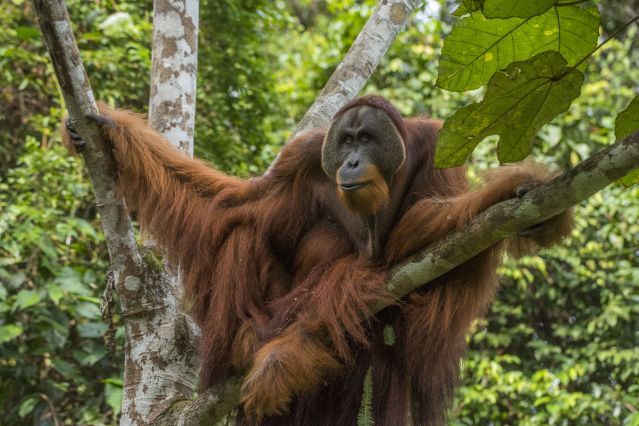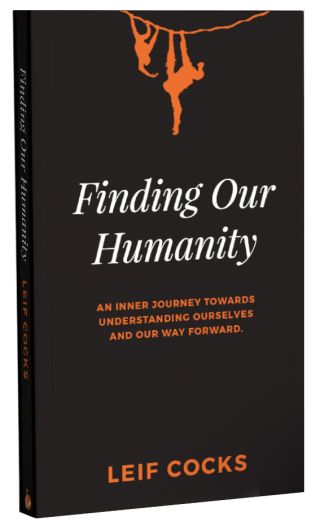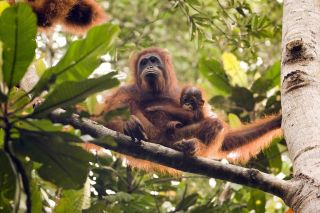Cognition
Finding Our Humanity: The Evolution of the Ape-Human Mind
Orangutan expert Leif Cocks explains what it means to be truly human.
Updated October 6, 2024 Reviewed by Tyler Woods

I recently learned about two books by Leif Cocks, founder of The Orangutan Project and a world-renowned orangutan expert. The first of his books is titled Orangutans: My Cousins, My Friends, based on more than three decades of working on behalf of great apes. The second is Finding Our Humanity: An Inner Journey Towards Understanding Ourselves and Our Way Forward.
I'm pleased Leif could answer a few questions about Finding Our Humanity, a thoughtful book in which he offers practical ways in which we, as individuals and collectively, can transcend our biological and cultural histories to create a higher understanding, happiness, and connection with nature.
Marc Bekoff: Why did you write Finding Our Humanity?
Leif Cocks: I wrote Finding Our Humanity after finishing my second book, Orangutans: My Cousins My Friends, and realized I had more to say.

MB: Who do you hope to reach with this book?
LC: People who can benefit from the knowledge and, in turn, can use the knowledge to benefit others and the planet.
MB: What are some of the major topics you consider?
- Human Nature and the Chimpanzee Mind: Cognitive dissonance is a way of seeing that allows us to hold contradictory or conflicting ideas, beliefs, attitudes, perceptions and ideologies at the same time. This state often causes inner discomfort as old ways of seeing or understanding the world are brought into question by the arrival of new information, facts, or experiences. These new perspectives can result in us challenging our existing ideas or values. However, when we still choose to hold onto the old ways of seeing, we can experience another effect of cognitive dissonance as we become blind to any information that makes us question our established attitudes and reject them based upon the internal blind spot we have in our beliefs. Therefore, although cognitive dissonance is experienced when we encounter inconsistency within our thoughts, we can either choose to alter our perspective or elect to ignore the new data altogether.
- How We Think: On this journey to finding our humanity is an inner one in which we explore some of our basic psychology. This means our first task must be to look within ourselves and become aware of our internal landscape and habitual thinking because if we truly wish to see a shift in the outer world, we must first cultivate a shift within ourselves. When we are blind to the influences of our biological drives, instinctive behaviours, and cultural programming, our thinking can become imbalanced. Therefore, we need to restore the balance in our thinking and in our society to solve the problems of our times. By bringing greater balance and integration into our inner world, we are more able to express this internal harmony in the external world and share this with others. Correspondingly, it is a natural progression to bring the equilibrium of a more balanced inner perspective into our thinking, and in this way, everyone benefits, ourselves included.
- Thinking with Both the Heart and the Head: When we consider how we think, we usually associate it with our brain or mind. However, I have found one of the most powerful shifts we can make to our way of thinking is to balance the reason of the intellect with the compassion of the heart. By doing so, we give ourselves the best opportunity to approach life with a broader, more considered perspective, one which provides greater poise, stability, and a longer-term view into the future. The combined wisdom of the head and the loving kindness of the heart work as two wings of a bird, functioning seamlessly together to create better outcomes in all areas of our lives. Furthermore, as the metaphor of the bird in flight implies, by using both the head and the heart in unison, our thoughts lift upwards and we begin to think and act from a higher, lighter state of being.1
- Balancing the Masculine and Feminine: It is time for us to redress the balance and bring back into equilibrium both masculine and feminine input. This translates at all levels of our societies, organisations, governments, communities, and homes. We can do this by respecting and valuing the contribution of the feminine, not as better than or superior to the masculine, but as of equal merit and complementary strength. Balance is a natural state. By disempowering the feminine and removing it from its intrinsic place within our cultures, we have put ourselves out of balance, with disastrous consequences. We have all suffered—the masculine, the feminine, the environment, and all other living beings. This began when the imbalanced masculine force of production, competition, expansion, reward, and short-term thinking was no longer tempered by the more nurturing distribution focused on the conservative, sustainable, and long-term approach of the feminine.
- Transcendence: My hope for the future is that we would each choose to extend our humanity outwards to all living beings, understanding their value and worth and respecting their right to live safe, wild, and free. I hope that we can shine our individual lights, add our support to conservation organizations that do good work, and join together to make the changes and take the steps that we all know are necessary. Now is the time to find our humanity, to transcend our biology, culture, and tribal past, and spread the light of true humanity into the world. There is no time to waste.
MB: How does your book differ from others that are concerned with some of the same general topics?

LC: It explores humanity from the perspective of a primatologist and acknowledges the agricultural and industrial revolutions are too recent to affect who we are as a species. Thus, we are hunter-gatherers who are still dysfunctional in our new environment. I also come from an understanding that does not need to explain the evolution of self-awareness. Contrary to this "physicalism" perspective, I believe in idealism, where reality is dependent on universal consciousness.
MB: Are you hopeful that as people learn more about other primates they will come to treat them and other humans with more compassion and respect?
LC: I don’t believe in hope. I believe hope always comes with its companion, despair, and so it is just a temporary band-aid. I instead promote love that naturally connects, communicates, and enriches others.
References
In conversation with Leif Cocks, founder of The Orangutan Project and world-renowned orangutan expert, As a result of his almost 30 year career working with orangutans. Leif is a passionate campaigner for orangutans and has been the leader of The Orangutan Project since its inception. Leif is also the author of Orangutans and their Battle for Survival.
1) Also see Bekoff, Marc. Rewilding Our Hearts: Building Pathways of Compassion and Coexistence. New world Library, 2014.


